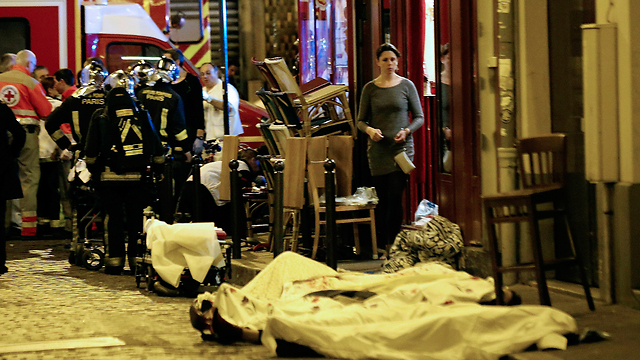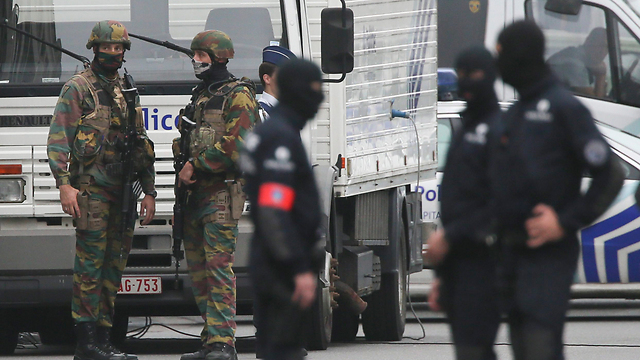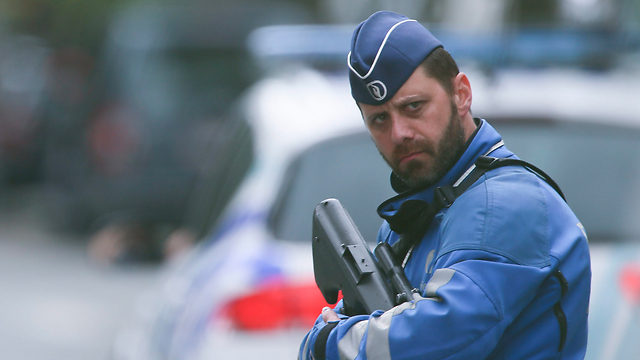
Amnesty: 'Draconian' EU anti-terror laws target Muslims
Human rights NGO Amnesty International slams EU anti-terror laws; Amnesty says measures cracking down on glorifying terrorism infringe on free speech; France arrests masses of minors under laws.
PARIS/BRUSSELS- The French jihadi left prison to serve out his parole, landing a part-time job as required. Then came the deadly Nov. 13, 2015, attacks in Paris. Sofiane Ifren was placed under house arrest, where he has stayed ever since. Stuck at home, he cannot serve out the terms of his parole.
France's top constitutional court on Monday was given three months to consider one of the most-criticized aspects of the country's state of emergency: its ability to keep people considered a threat under house arrest as long as the state of emergency lasts. Renewed five times since the attacks in Paris that killed 130 people, the state of emergency has come under criticism from rights groups as one of the most extreme examples in a growing European trend toward draconian anti-terrorism laws.
Amnesty International on Tuesday said European counterterrorism measures in the past two years are rapidly -and potentially permanently - eroding basic human rights throughout the continent.
During that period, militant attacks have killed some 280 people in France, Belgium and Germany.
The attacks, mostly claimed by ISIS, have fanned tensions over immigration, fuelled the popularity of right-wing parties and made security a key theme in upcoming French, Dutch and German elections.
"Right across the EU regional space we see Muslims and foreigners being equated with terrorists," said Julia Hall, an Amnesty International expert on counterterrorism and author of the report. "This stereotyping so disproportionately affects these communities that there is a high degree of fear and alienation."
She warned that "draconian" surveillance measures and powers of search, detention and arrest like those introduced in France since November 2015, when attacks killed 130 people, could be abused to target activists or minority groups that did not pose a genuine threat.
Amnesty's report said new measures to crack down on glorifying or being an apologist for terrorism were shrinking the space for freedom of expression. In France in 2015, a third of more than 380 people prosecuted for apologizing for terrorism were minors, it said.
Amnesty condemned what it dubbed the "Orwellian" use of curfews, travel restrictions and police check-ins to monitor individuals who were not convicted of crimes and often did not know what they were accused of.
Hall criticized what she described as "governments looking at a person and saying: 'You look very suspicious to me. So I'm going to restrict your behavior because I think you might commit a crime.'"
For French Prime Minister Manuel Valls, who is now running for the presidency, that's just fine.
"Let's be clear: this terrorist threat will last a generation. Today we have to live with a kind of permanent state of emergency," he told Le Parisien newspaper last week.
Ifren will have to wait at least three more months to learn whether his house arrest under the state of emergency will be upheld. The rest of France, where it was extended until after an election this spring ushers in a new government, will have to wait somewhat longer.
The Amnesty International report echoed what other rights groups fear: That Europe has traded away its rights in exchange for a false sense of security. The report examined 14 countries and eight categories, including emergency laws, privacy rights, and efforts to strip nationality from people convicted of terrorism.
"We have to dismantle the paradigm that says there is the state of emergency or nothing in the fight against terrorism, that security equals restriction of rights equals state of emergency," said Dominique Curis, Amnesty's director in France.
Britain's recently passed Investigatory Powers Act law - which offers officials a no-warrant-needed access to the intimate details of citizens' online lives - is among the most severe in Europe, but its implementation has been derailed by a recent European Court of Justice ruling.
Even without the act, the U.K. government has a range of surveillance powers -- many of them used to police pedestrian issues, including parents suspected of sneaking their kids into better school districts, scofflaws dumping trash on the street or renegade dog walkers who refuse to pick up their pets' poop.
Reporters and leakers are another popular target. In 2015, Britain's interception watchdog revealed that police had used their surveillance powers to monitor the calls and emails of 82 journalists over a three-year period.
In Germany, where a radicalized Tunisian hijacked a truck and mowed down a Christmas market on Dec. 19, the government recently announced measures to force some people labeled potential threats to wear ankle monitors even if they have not been convicted.
Truck attacker Anis Amri's asylum request had been denied and he had been flagged as a danger, but paperwork problems delayed his deportation from Germany.
A government's political persuasion matters little when considering rights issues, said John Dalhuisen, Amnesty's director in Europe.
"You give the power to one government, the government changes, and it's very difficult to get it back," he said.
The European Union, whose anti-terrorism directive was singled out in the Amnesty report, said human rights remained paramount and disagreed with its conclusions.
"Fundamental rights are precisely what the terrorists attack. And measures adopted in the field of security should not, do not and must not in the future reduce the standards of protection of fundamental rights, which is one of the pillars on which the EU is built," said EU spokeswoman Tove Ernst.














